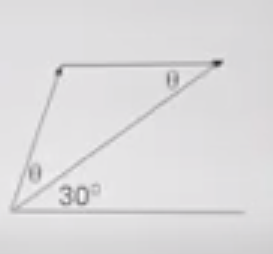STATEMENT-1: A man can cross river of width d in minimum time t. On increasing river velocity, minimum time to cross the river by man will remain uncharged.
STATEMENT-2: Velocity of river is perpendicular to width of river. So time to cross the river is independent of velcoity of river.
Statement -1 is True, Statement-2 is Ture, Statement-2 is a correct explanantion for Statement-1.
Statement-1 is Ture, Statement-2 is Ture, Statement-2 is Not a correct explanantion for Statement-1.
Statement-1 is True, Statement-2 is False.
Statement-1 is False, Statement-2 is True.
The correct Answer is:A
To solve the problem, we need to analyze the two statements provided and determine their validity based on the principles of kinematics.
1. Understanding the Problem:
- We have a river of width d.
- A man can cross this river in a minimum time t.
- We need to evaluate the effect of increasing the river's velocity on the time taken to cross.
2. Analyzing Statement 1:
- The statement claims that if the river's velocity increases, the minimum time t to cross the river will remain unchanged.
- To analyze this, we need to consider the direction of the river's flow and the man's crossing.
3. Analyzing Statement 2:
- This statement asserts that the velocity of the river is perpendicular to the width of the river.
- Since the river's velocity is perpendicular, it does not affect the time taken to cross the river.
4. Determining the Time to Cross the River:
- The time t to cross the river can be calculated using the formula:
t=dvm
where vm is the velocity of the man crossing the river.
- The river's velocity vr does not enter this equation because it is perpendicular to the direction of crossing.
5. Conclusion on Statement 1:
- Since the time to cross the river depends only on the width d and the man's velocity vm, increasing the river's velocity vr does not change the minimum time t.
- Therefore, Statement 1 is true.
6. Conclusion on Statement 2:
- Since the river's velocity is indeed perpendicular to the width of the river, it confirms that the time to cross is independent of the river's velocity.
- Therefore, Statement 2 is also true.
7. Final Evaluation:
- Both statements are true, and Statement 2 correctly explains Statement 1.
- Thus, the answer is A: Both statements are true, and Statement 2 is the correct explanation for Statement 1.
- We have a river of width d.
- A man can cross this river in a minimum time t.
- We need to evaluate the effect of increasing the river's velocity on the time taken to cross.
- The statement claims that if the river's velocity increases, the minimum time t to cross the river will remain unchanged.
- To analyze this, we need to consider the direction of the river's flow and the man's crossing.
- This statement asserts that the velocity of the river is perpendicular to the width of the river.
- Since the river's velocity is perpendicular, it does not affect the time taken to cross the river.
- The time t to cross the river can be calculated using the formula:
t=dvm
where vm is the velocity of the man crossing the river.
- The river's velocity vr does not enter this equation because it is perpendicular to the direction of crossing.
- Since the time to cross the river depends only on the width d and the man's velocity vm, increasing the river's velocity vr does not change the minimum time t.
- Therefore, Statement 1 is true.
- Since the river's velocity is indeed perpendicular to the width of the river, it confirms that the time to cross is independent of the river's velocity.
- Therefore, Statement 2 is also true.
- Both statements are true, and Statement 2 correctly explains Statement 1.
- Thus, the answer is A: Both statements are true, and Statement 2 is the correct explanation for Statement 1.
Similar Questions
Knowledge Check
Which river crosses the Equator twice ?
A1.AmazonB2.CongoC3.NileD4.OrinocoWhich river crosses the equator twice?
AAmazonBCongoCNileDOrinocoA person reaches on a point directly opposite on the other bank of a river.The velocity of the water in the river is 4m/sand the velocity of the person in still water is 5m/s.If the width of the river is 84.6m, time taken to cross the river in seconds is
A9.4B2C84.6D28.2
Crossing River In Minimum Time
View SolutionRain Problem||River Boat||Minimum Time
View SolutionVelocity of man w.r.t river is equal to velocity at river value of θ for which man reaches directly at B

View SolutionThe river is very deep to be crossed.
View SolutionIn the previous problem, the man wants to cross the river in the minimum time. In which directions, he should move? Find the minimum time to cross the river and his displacement (drift) along the flow.
View Solution

